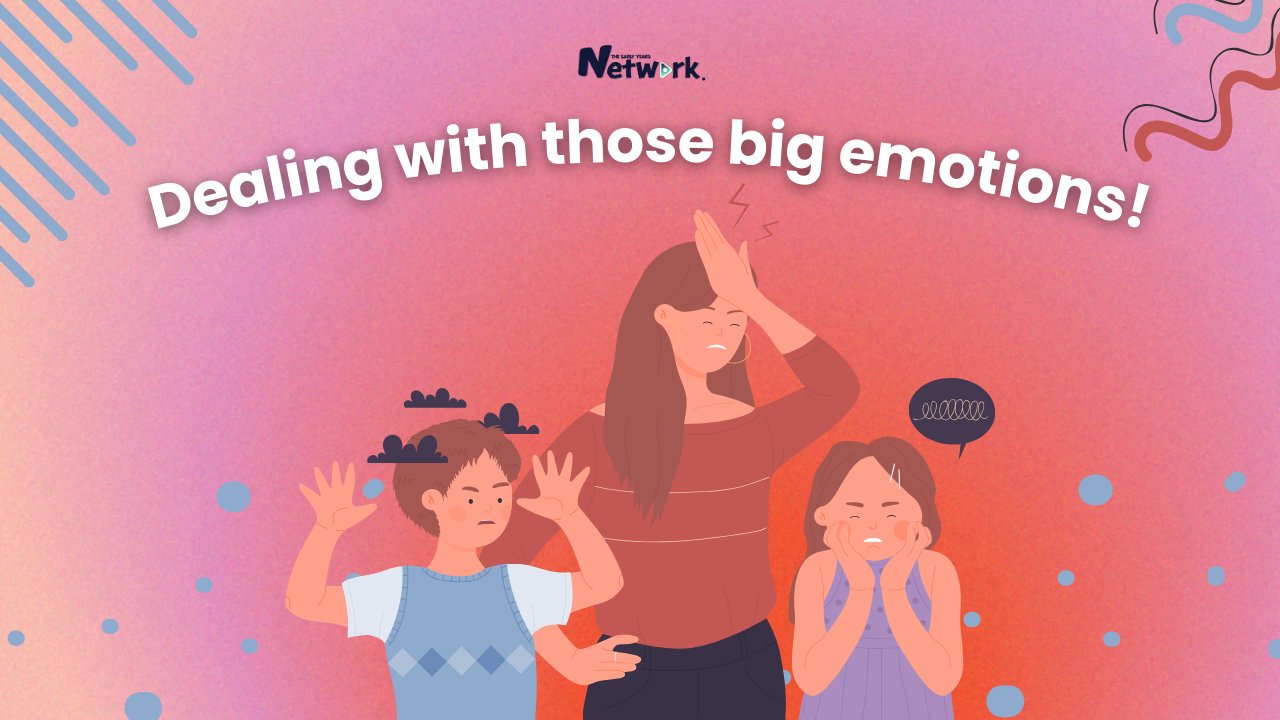Helping children deal with those big emotions!
With brain activity at an all time the early years is when we build our foundations for later life, whether that be our cognitive skills, brain development, social skills, physical health, behaviors or our emotional intelligence. In this article we will explore effective strategies to help children cope with their big emotions and cultivate emotional intelligence from an early age.

The Importance of Emotional Intelligence in Children
Firstly emotional intelligence is a crucial skill for children to develop as it equips them with the tools to handle and express their emotions in healthy ways. However, young children often struggle with understanding and managing their emotions. As parents and early years educators, it is our responsibility to support them along this journey in a number of different ways.
Emotional intelligence, also known as EQ, plays a significant role in various aspects of a child's life. It influences their communication skills, social interactions, self-regulation, adaptability, decision-making abilities, and self-image. By teaching children how to be emotionally intelligent from a young age, we are setting them up for success in all areas of their lives. Before diving into strategies for managing emotions, it is essential to familiarise ourselves with the eight primary emotions that all children experience. These emotions are anger, joy, interest, sadness, surprise, disgust, fear and shame. By recognising and labelling these emotions, we can help children develop a deeper understanding of their feelings and facilitate effective communication about their emotional experiences.
Encouraging Emotional Play
One effective way to help children explore and understand their emotions is through emotional play. Engaging in play activities that involve emotions allows children to express and process their feelings in a safe and supportive environment. For example, using dolls or puppets to demonstrate physical reactions related to different emotions can help children connect their experiences with specific feelings. Additionally, incorporating silly voices, exaggerated facial expressions, or mimicking different emotions can make the learning process enjoyable and engaging for children.

The Power of Language: Talking About Emotions
Communication plays a vital role in helping children develop emotional intelligence. By initiating conversations about emotions, we can create a safe space for children to express and discuss their feelings openly. Asking children how they are feeling, talking about their emotions, and explaining the causes and effects of different emotions can enhance their emotional vocabulary and understanding. It is also essential to discuss other people's emotions, as this promotes empathy and helps children recognize and validate the feelings of others.
The Importance of Validation
Validating children's emotions is another crucial step in supporting their emotional development. When children experience intense emotions, it is essential to acknowledge and validate their feelings before moving on to problem-solving or offering solutions. Validating their emotions helps children feel understood, accepted, and supported. Phrases such as "I can see why that would make you cry" or "It's okay to feel angry about this" can go a long way in creating a nurturing and empathetic environment for children to express and process their emotions.

Teaching Coping Skills
Coping skills are essential tools for managing emotions and navigating challenging situations. Introducing coping skills to children during calm moments allows them to build a repertoire of healthy strategies for dealing with their emotions. As parents and caregivers, we can model coping skills by openly discussing our own emotions and how we manage them. Breathing exercises, visualisation techniques, engaging in physical activities, and seeking support from trusted individuals are examples of effective coping mechanisms that children can learn and implement in their daily lives.
The Power of Books: Resources for Emotional Regulation
Books can be powerful tools for teaching children about emotions and emotional regulation. There are numerous children's books available that address the topic of emotions in a relatable and engaging manner. Starting with books that introduce general emotions and gradually exploring books that focus on specific feelings can help children develop a deeper understanding of their emotions. Reading stories about characters who experience and navigate through various emotions can normalise these experiences for children and provide them with valuable insights and strategies for managing their own feelings.
Providing an Emotional Outlet
Children benefit from having a variety of outlets for expressing their emotions. Creative activities such as journal writing, drawing, dancing, or talking to a friend can serve as effective emotional outlets. Encouraging children to express their feelings through these activities allows them to process and release their emotions in a healthy and constructive manner. It is crucial to emphasise that there is no "right" way to express emotions, and children should choose outlets that feel comfortable and meaningful to them.

The Power of Calm: Modelling Self-Regulation
As adults, our own emotional regulation and self-regulation skills serve as powerful models for children. Demonstrating calm and composed behaviour during challenging situations can teach children how to handle their emotions effectively. Taking deep breaths, stepping away momentarily to collect ourselves, or openly discussing our own emotions and coping strategies can show children that it is possible to navigate difficult emotions in a healthy and controlled manner. Modeling self-regulation helps children understand that it is normal to experience strong emotions and that there are constructive ways to manage and express them.
Differentiating Between Feelings and Behaviour
It is crucial to help children understand that while all emotions are valid and acceptable, their behaviour in response to these emotions is what requires guidance and appropriate choices. Engaging in discussions about feelings and behaviour allows children to distinguish between their emotions and the actions they take as a result. By teaching children that they have control over their behaviour, we empower them to make conscious decisions about how they express their emotions. Encouraging them to find alternative ways to respond to difficult emotions fosters their growth and development of healthy emotional regulation skills.
Instilling a Growth Mindset
Embracing challenges, setbacks, and uncomfortable emotions as opportunities for growth is an important aspect of emotional intelligence. Teaching children to adopt a growth mindset helps them understand that difficult experiences and emotions are not obstacles but rather stepping stones towards personal growth and improvement. By reframing their perspective on challenging situations, children can develop resilience and a positive outlook on their emotional journey.
Conclusion
Helping children manage their big emotions and cultivate emotional intelligence is a continuous and rewarding journey. By providing a nurturing and supportive environment, encouraging open communication, teaching coping skills, validating their emotions, and modelling self-regulation, we can empower children to navigate their emotional landscape with confidence and resilience. By embracing emotions as valuable messengers and opportunities for growth, we can equip children with the skills they need to lead happy, fulfilling lives. Let us embark on this journey together and support the emotional well-being of our little ones.



Comments 0
Leave a comment
Only your name will be published. Required fields are marked *